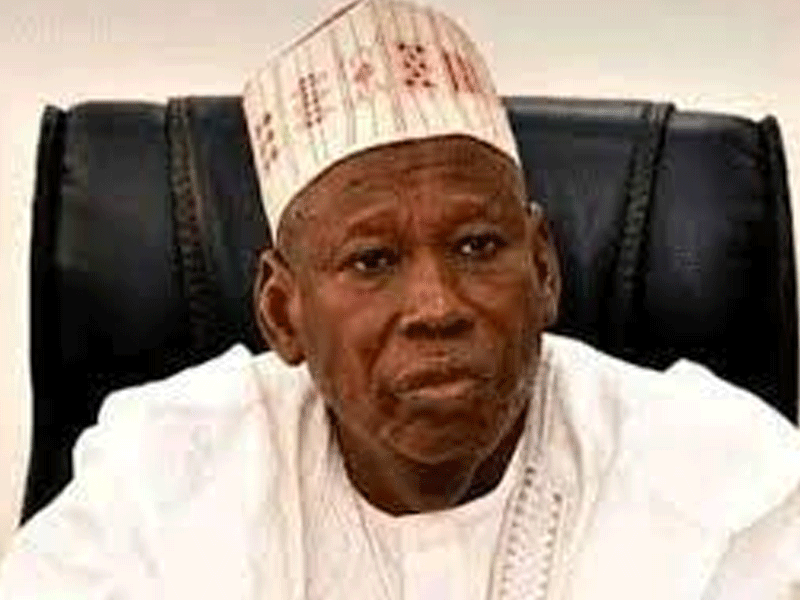The sudden resignation of Dr. Abdullahi Ganduje as National Chairman of the All-Progressives Congress (APC) last Friday may have been publicly chalked up to “health reasons,” but in Nigeria’s high-stakes political arena, insiders and observers alike agree: this was a calculated sacrifice in President Bola Ahmed Tinubu’s evolving power chessboard ahead of the 2027 general elections. With less than two years to the next presidential contest, Tinubu appears to have entered full campaign mode; tightening his grip on the APC, neutralizing opposition, re-aligning old foes, and executing a bold strategy of political consolidation across Nigeria’s key regions. And Ganduje’s ouster, while officially cloaked in civility, reveals the ruthless pragmatism that underpins Tinubu’s survivalist instincts.
The Real Story Behind Ganduje’s Exit
Though the Kano politician cited health reasons in his resignation letter, sources within the APC secretariat and across regional caucuses point to a power play orchestrated by Tinubu himself. Ganduje had increasingly become a political liability. His leadership was marred by controversy, including allegations of favoritism during the FCT council primaries, and growing internal discontent, especially among North Central party stakeholders still bitter over the “hijacking” of the national chairmanship after Senator Abdullahi Adamu’s exit in 2023.
But the biggest red flag for Tinubu may have been Ganduje’s frosty relationship with Senator Rabiu Musa Kwankwaso, leader of the New Nigeria Peoples Party (NNPP) and the former Kano governor whose political influence in the North remains formidable. With Kwankwaso reportedly being courted by both Tinubu and former Vice President Atiku Abubakar, it was increasingly untenable for Tinubu to keep Ganduje, Kwankwaso’s arch-rival as the face of APC. By easing Ganduje out, Tinubu cleared the path for a possible détente or defection deal with Kwankwaso, one that could deliver Kano’s massive voting bloc in 2027.
Fractures and Realignments in APC
Ganduje’s resignation has already triggered agitation from the North Central zone, which insists the national chairmanship should revert to the region under the party’s original zoning formula. Five notable figures are being tipped: Tanko Al-Makura, Joshua Dariye, Yahaya Bello, Solomon Ewuga, and Senator Sani Musa. The return of the chairmanship to North Central would not only placate aggrieved stakeholders but also strengthen APC’s hold in the region, which will be vital in the next general election. However, the North West is not backing down, with loyalists promoting Senator Abu Ibrahim of Katsina, one of Tinubu’s most trusted northern allies. The decision over who emerges as APC’s next chairman may become a litmus test of Tinubu’s ability to manage internal party dissent while still executing his broader national strategy.
A President on the Offensive
What’s emerging is a picture of a president not on the defensive, but on the offensive. Tinubu is drawing from his 2013 playbook—when he helped build the APC coalition that unseated the PDP – now turning that strategy on its head to prevent the same from happening to him. His efforts are not limited to the North. In the South-South, Tinubu has orchestrated a high-stakes reconciliation between Rivers State Governor Siminalayi Fubara and his estranged political godfather, FCT Minister Nyesom Wike. This move effectively halts internal PDP chaos from spilling over into APC territory, and signals Tinubu’s ambition to turn Rivers into a battleground state under his influence. Insiders say Tinubu is forging a “tri-regional alliance” – anchored on Lagos (South-West), Kano (North-West), and Rivers (South-South). If he can neutralize Atiku in the North-East, mend fences in the North-Central, and continue leveraging incumbency in the South-West, Tinubu may well enter 2027 with a formidable firewall.
The Rise of ADA: A Familiar Threat
Yet Tinubu is not without significant threats. The All-Democratic Alliance (ADA) – a budding opposition coalition seeking registration with INEC – is rapidly gaining momentum. Spearheaded by disenchanted APC members, influential PDP figures, and third-force advocates, the ADA mimics the same strategy that led to the creation of APC in 2013. Key players rumored to be involved include Atiku, Kwankwaso (if Tinubu fails to sway him), and even controversial figures like Nasir El-Rufai and Rauf Aregbesola – two men who have fallen out with Tinubu in recent years. In a twist of irony, Tinubu now finds himself defending a political structure built from opposition unity, facing a rebirth of that very model, this time aimed at dislodging him.
The Bigger Picture: 2027 and the Battle for Nigeria
With the opposition slowly coalescing and Tinubu flexing the powers of incumbency and strategic reconciliation, the 2027 election is shaping up to be one of Nigeria’s most consequential. For the APC, internal stability and regional balance are crucial. For the ADA, unity and credibility are paramount.
Ganduje’s resignation is not the end of a chapter – it is the prologue to a larger political war. Tinubu has shown he is willing to shed even loyal allies to stay in control. But will it be enough?
Conclusion
Tinubu’s strategic sacrifice of Ganduje is a warning shot to both allies and adversaries: loyalty alone won’t guarantee survival in his political calculus. As new alliances form and old rivalries thaw, the race to 2027 is less about ideology and more about control, consolidation, and calculated moves.
One thing is clear—Nigeria’s political landscape is shifting again, and the old general is on the march.





